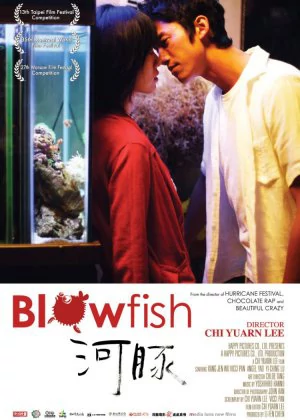Blowfish
Taiwanese dramas are usually a pretty safe bet and while most of them are not all that original or creative, in the end they definitely know how to deliver. Blowfish [Hetun] is one of the best examples I've seen so far, only sparingly experimenting with more frivolous elements, yet fleshing out one of the dearest romances I've seen on film so far. Chi Y. Lee just bumped up a few notches on my list of notable discoveries.
![screen capture of Blowfish [Hetun]](/thumbs/img/articles/1200xauto/blowfish-1.webp)
Between this film and Lee's short film Smoke (included in the Taipei 24h anthology) it's clear that Lee both understands and embraces the visual aspect of the medium. While there are some sparse dialogues in Blowfish, they are few and far between, and they consist mostly of small-talk. The real emotions are happening on-screen, acted out by the actors rather than scripted by a team of writers. In that sense Lee's films are more closely related to Japanese dramas (or by extension, the work of Kim Ki-duk - Dream, Breath) instead of the seemingly more obvious link with China and Hong-Kong.
Blowfish documents the blossoming relationship between two young people, both with deep emotional scars that prevent them from easily committing to each other. Xiao Zhun flees the city after finding her current boyfriend in bed with another woman. An online auction brings her to a small, rural village where she runs into a young baseball coach. The two get together, but the coach (whom I believe remains nameless throughout the film) clearly has his own set of issues to deal with. They decide to live together, slowly discovering each other and slowly growing to love each other.
And really, there isn't much more to this film. Lee isn't too interested in throwing in some extra dramatic strands to keep things exciting (except for the short finale), instead he chooses to focus on the tepid and uncertain developing relationship between the two main characters. The result is a slow yet beautiful, gracious and delightfully subtle film that plays one single card, but plays it so damn well that it easily lasts the 90 minute running time.
![screen capture of Blowfish [Hetun]](/thumbs/img/articles/1200xauto/blowfish-2.webp)
Taiwan has some great cinematographers and Blowfish benefits from the aesthetic grace so prevalent in these Taiwanese dramas. The film features some superbly orchestrated shots, benefits from beautiful lighting and even dares to include some playfully edited scenes in between. Nothing too daring or experimental, but noteworthy (and effective) nonetheless. The lush setting does its work too, resulting in pure eye-candy from start to finish.
The soundtrack is safe and trusted material, but executed with such love that it lifts the film to new heights. Somewhat reminiscent of the best work of Joe Hisaishi (piano and string tunes) it gives the film an incredibly soft and soothing atmosphere, making it all the easier to let yourself drift away on the woos of the young couple. Perfect material for a film like this.
Films like Blowfish require a lot of effort from the actors involved. Vicci Pan and Kang Jen Wu have to carry most of the film by themselves, and they don't get much help from dialogues or other narrative means to get their emotions across. They rely almost entirely on body language to sculpt their relationship and to draw the audience into their little love story. Both actors do a tremendous job though, even during some of the more daring scenes. The supporting cast is good too, though their work is quite limited as the film's focus is heavily fixated on the two main characters.
![screen capture of Blowfish [Hetun]](/thumbs/img/articles/1200xauto/blowfish-3.webp)
Blowfish is a film that will appeal to a certain type of film fans, in particular those who have a soft spot for Japanese (silent) dramas. The actors don't talk much, the drama is limited in scope and everything is handled with much grace and subtlety. A film like Blowfish can be boring as hell if you don't like its characteristics, but if you do then this film is definitely one of the finest and dearest examples out there, only surpassed by the work of Hiroshi Ishikawa (Su-ki-da, Tokyo.sora)
It's hard to recommend this film to people who don't really know what they're getting into. Blowfish has everything to be one of the most romantic films of 2011, but unless you feel fully at ease with the directing style of Lee it might just as well be one of the dullest stories ever told. I loved the film from start to finish, glad to once again meet a (mostly) silent couple that lives through the film without too many conversations or direct outbursts of emotions. This film will definitely get in my end of year list later this month, but approach with caution if you do not know what to expect.
